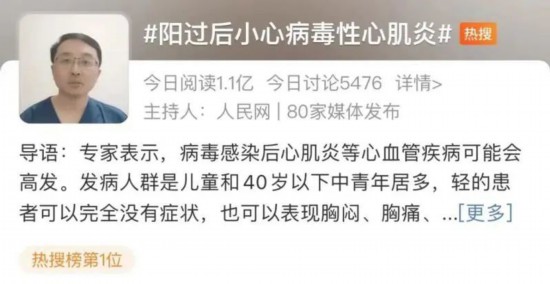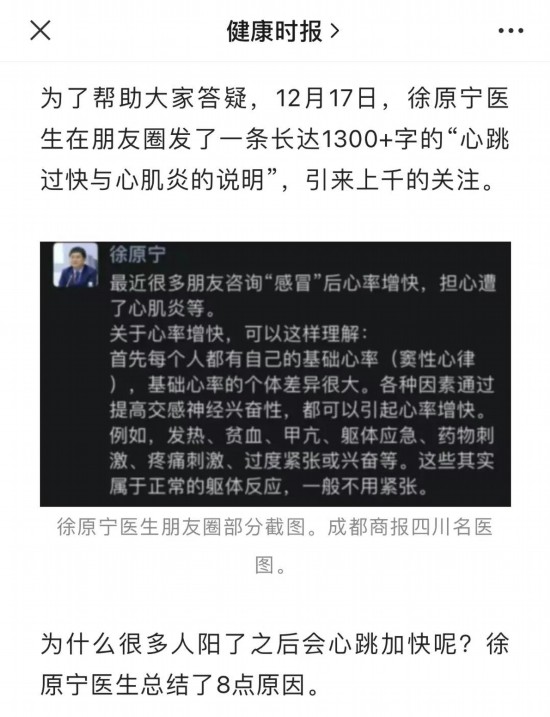Hot search first! Young people should also pay attention to this disease after "Yang" →
"Today, my heart suddenly beats faster.
It is easy to get flustered when you move. "
"My heart is beating a little fast. Do you want to go to the hospital?"
… …
Recently, various statements circulated on the Internet.
Arouse a new round of worries of "Yangkang people"
The topic of "Beware of viral myocarditis after yang"
Once rushed to the top of the hot search list.

Jin Dongyan, a virologist and professor at the School of Biomedicine, Li Ka-shing Medical College of the University of Hong Kong, told the reporter that acute myocarditis really needs attention among the complications of COVID-19.

What disease is myocarditis?
According to Beijing Daily, myocarditis is an inflammatory lesion of myocardium, which can be caused by infection (such as viruses, bacteria or fungi) or non-infection factors (such as autoimmune diseases), among which various viruses causing intestinal and upper respiratory tract infections are the most common.
Clinically, myocarditis is mostly caused by virus infection, and the common cold can also be induced.
Myocarditis can launch an "indiscriminate attack" on people of all ages and sexes, but young people aged 20-40 are more likely to be recruited than the elderly and children.
After the virus enters the blood, it reaches the heart with the blood circulation. If the patient’s resistance is weak, it may cause myocarditis. Viral myocarditis refers to acute or chronic inflammatory pathological changes caused by viral infection, which belongs to infectious myocardial diseases.
Viral myocarditis has the following manifestations according to the severity:
Early myocarditis: manifested as fatigue, chest tightness, shortness of breath, palpitation, dizziness, loss of appetite, nausea, vomiting, dyspnea, chest pain, etc.
Mild viral myocarditis: symptoms such as arrhythmia, tachycardia or bradycardia appear, and myocardial ischemic changes can generally be found by ECG;
Severe viral myocarditis: the condition is dangerous, and the mortality rate is extremely high, which can reach 70%~80%, and death or sudden death occurs within hours or days.
Is the heartbeat accelerated after "yang" because of myocarditis?
Why do many people’s hearts beat faster after "yang"? There are eight possibilities:
1. fever
Every time the body temperature rises by one degree, the heart rate increases about 10 times/minute. If accompanied by symptoms such as chills and shivering, the heart rate may increase even more. After the body temperature drops, the heart rate will slowly return to normal.
2. All kinds of drugs taken
Some of the drugs used to relieve symptoms may cause the heart rate to increase. For example, caffeine and aminophylline in cough medicine, antiasthmatic medicine, some drugs inhaled by atomization, etc. These drugs can relieve symptoms, but they can’t kill the virus. Therefore, you should take medicine when there are obvious symptoms, otherwise taking medicine will not help much.
3. Physical reaction of hypovolemia
After infection, due to insufficient food, diarrhea, vomiting, infection or gastrointestinal reaction caused by drugs, it may lead to a certain degree of hypovolemia, and the heart rate will be compensated and increased.
Therefore, during the period of infection, we should appropriately increase drinking water, eat less and eat more meals, and even drink oral rehydration salts. Be alert to dehydration and seek medical advice in case of thirst and oliguria.
4. All kinds of pain may also cause the heart rate to increase.
Many people have experienced various pains after being infected with COVID-19, such as "craniotomy above, leg sawing below, waist cutting behind, laparotomy in front, and throat cutting with a knife", which is enough to stimulate the heart rate to increase.
5. Body’s stress response to virus infection
After being infected with the virus, the human immune system is activated, and the immune activation itself may be accompanied by an increase in basal heart rate.
6. Severe hypoxia
This is a relatively serious cause of rapid heart rate increase, usually accompanied by shortness of breath, severe cough, lung image changes, etc., commonly known as severe infection. According to the national diagnosis and treatment standards, if the respiratory rate exceeds 30 beats/min and the blood oxygen saturation continues to be lower than 93%, you should be careful of severe infection.
7. Accelerated heart rate induced by aggravation of basic diseases.
For example, patients with basic chronic obstructive pulmonary disease (commonly known as emphysema) and patients with basic heart disease (especially chronic heart failure) should be paid attention to if there is sustained increase in heart rate in these patients. The more obvious the heart rate increases, the more dangerous the condition may be. You should go to the hospital for examination and evaluation as soon as possible.
8. Myocarditis
Like other viral infections, Omicron has a certain probability of inducing myocarditis after infection. However, myocarditis usually occurs in the late stage of virus infection or 1-2 weeks later, which is related to virus-related immune response. In addition to the increase of heart rate, ECG will change and myocardial markers will increase significantly.

What circumstances should be suspected of viral myocarditis?
Pan Hongying, director of the Infectious Diseases Department of Zhejiang Provincial People’s Hospital, said that the course of myocarditis may last for hours to months, and serious complications such as cardiac arrest caused by dilated cardiomyopathy or heart failure.
If you have discomfort such as palpitation, chest tightness and shortness of breath, you need to be vigilant. It is recommended to seek medical advice in time, have an electrocardiogram and blood test. Generally, young people who love to stay up late are more likely to get fulminant myocarditis. If not found early, it will easily lead to cardiac arrest and multiple organ failure. It is suggested to rest, sleep more and not do strenuous activities within two weeks after infection.
Zhang Lei, deputy director of the Respiratory Department of Shanghai Children’s Medical Center affiliated to Shanghai Jiaotong University School of Medicine, said that it is necessary for the recovered people in COVID-19 to rest in 1-2 weeks. Zhang Lei said that after Covid-19’s infection, human immune function will appear obvious disorder, that is, the number and function of lymphocytes will decrease in the acute stage of infection, and then slowly return to normal with the recovery of the disease. Most people will have this "immune disorder period" lasting for 1-2 weeks. During the period, other viruses, bacteria, etc. are very easy to take advantage of.
If you are isolated at home alone, it is best to keep in touch with friends and relatives around you at any time, so as to avoid discomfort and go to the hospital in time.
Can you get myocarditis immediately after Yangkang?
According to the Life Times, the online saying that "it is easy to get myocarditis after recovering from yang kang" is actually exaggerated.
Even if you suffer from myocarditis after "Yangkang", the more direct reason is that Covid-19 has invaded the myocardium, and exercise is a fuse. In other words, the virus can only cause myocarditis if it invades the myocardium.
Li Dong, the chief physician of the Department of Infectious Diseases of Beijing You ‘an Hospital, once said that after COVID-19 recovered, it would take a week or two for many people to return to their previous physical condition, and it was suggested not to take strenuous exercise in the early stage of recovery.
China Youth Daily (finishing: Chen Yishan) Source: Beijing Daily WeChat WeChat official account, People’s Daily, Health Times, Life Times, and Metropolitan Express.